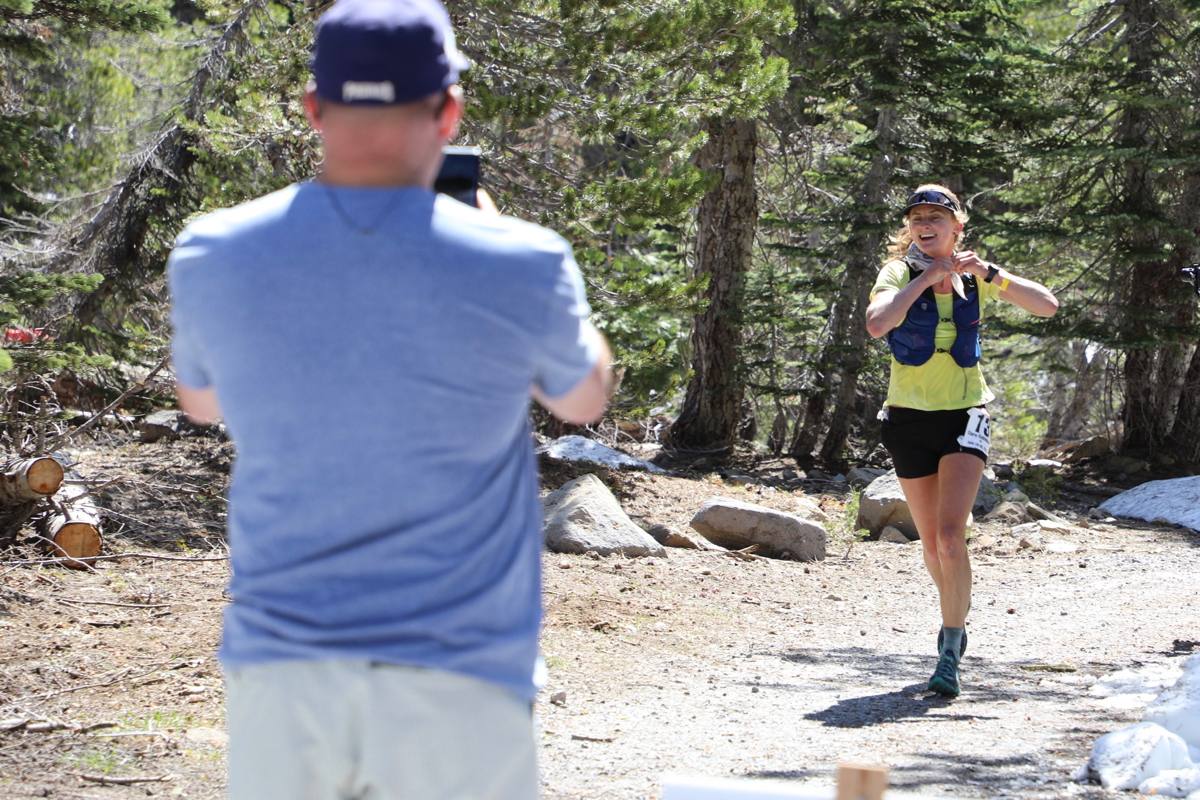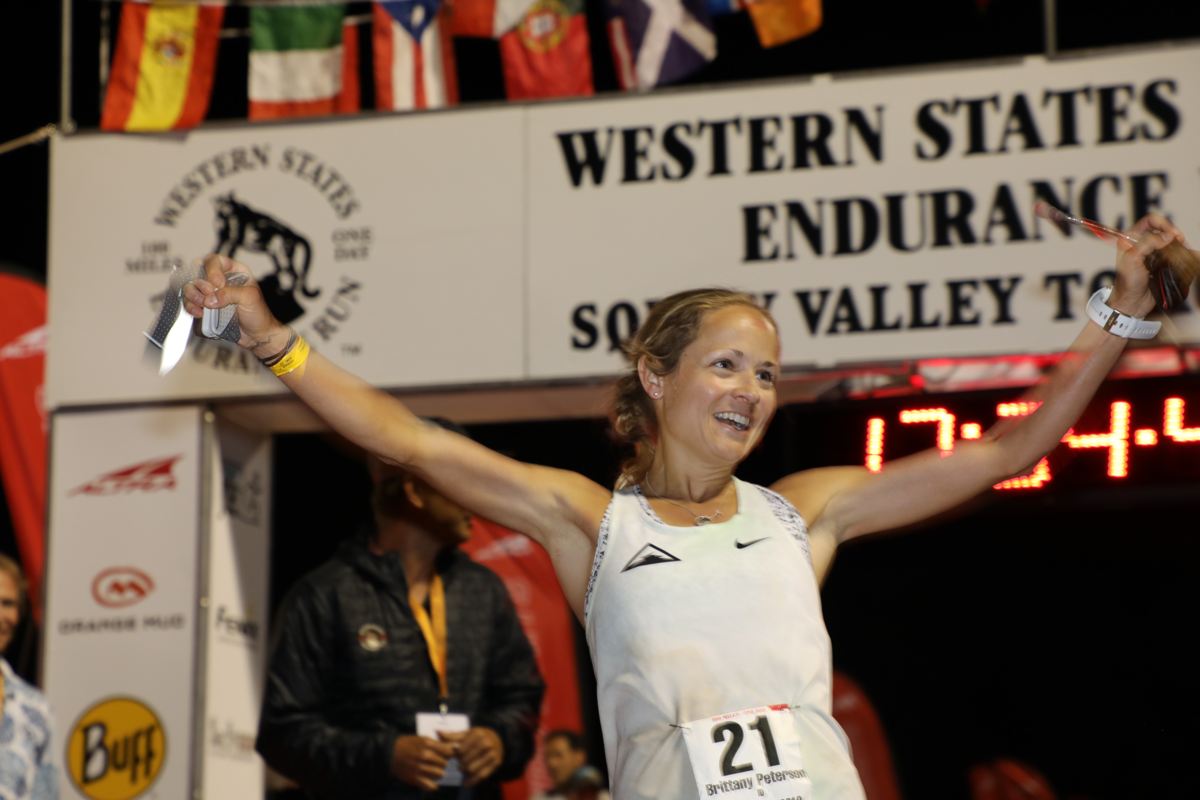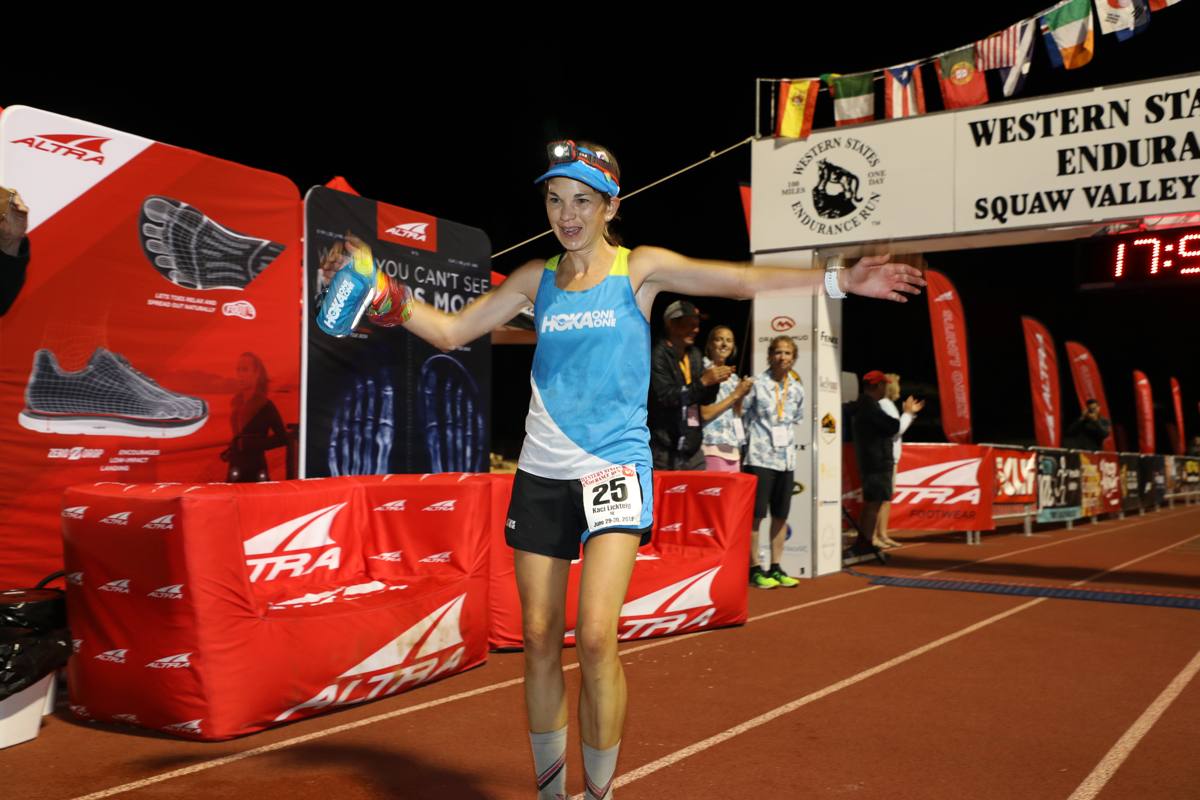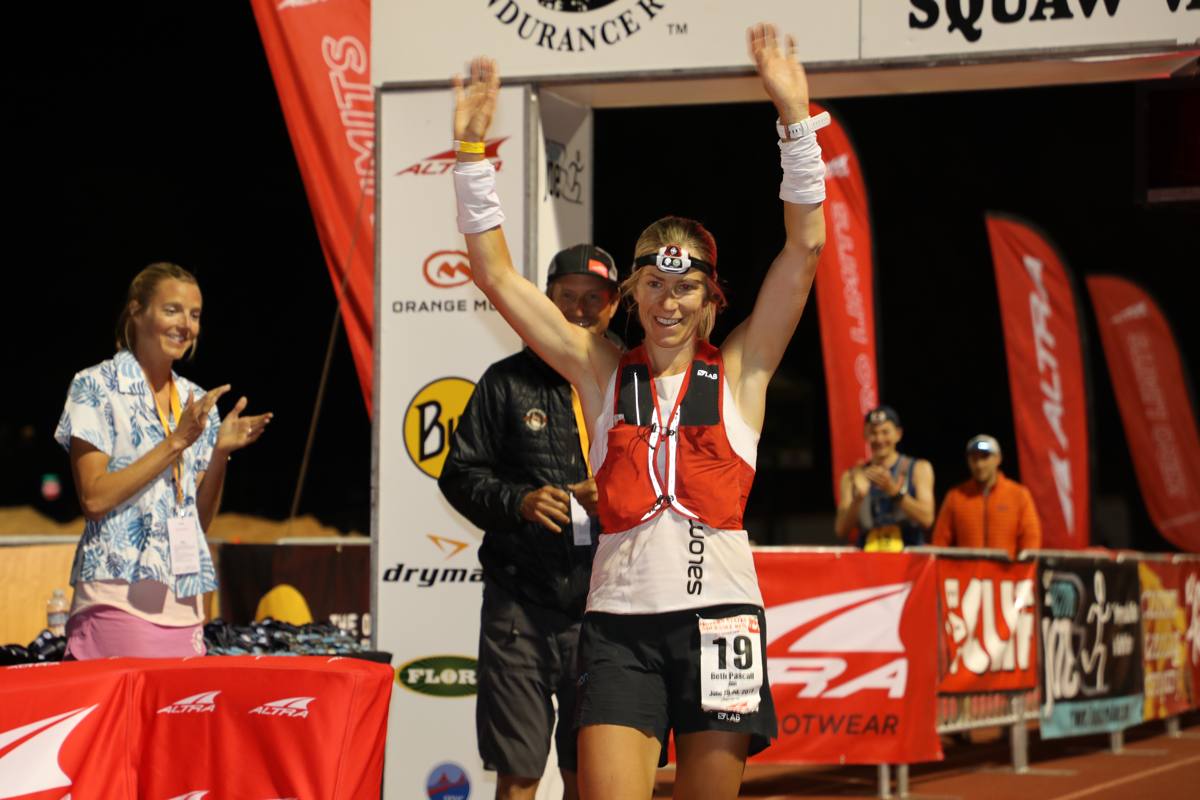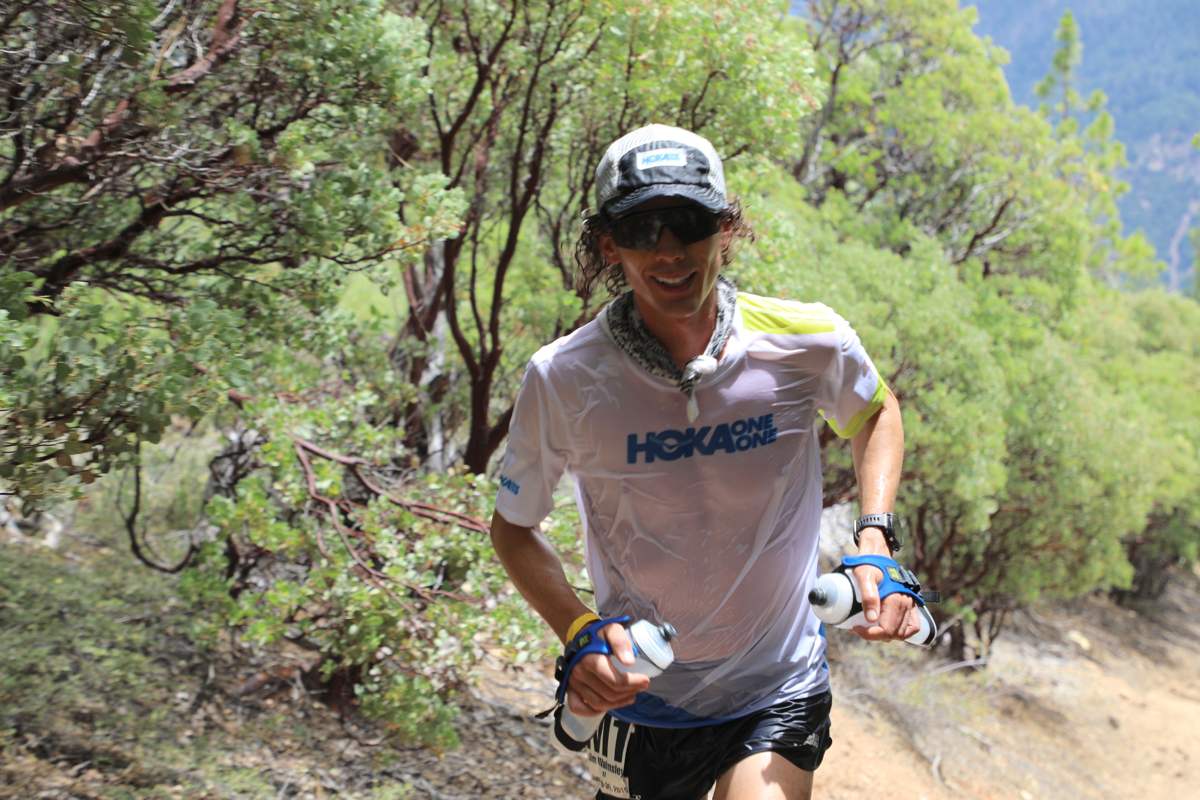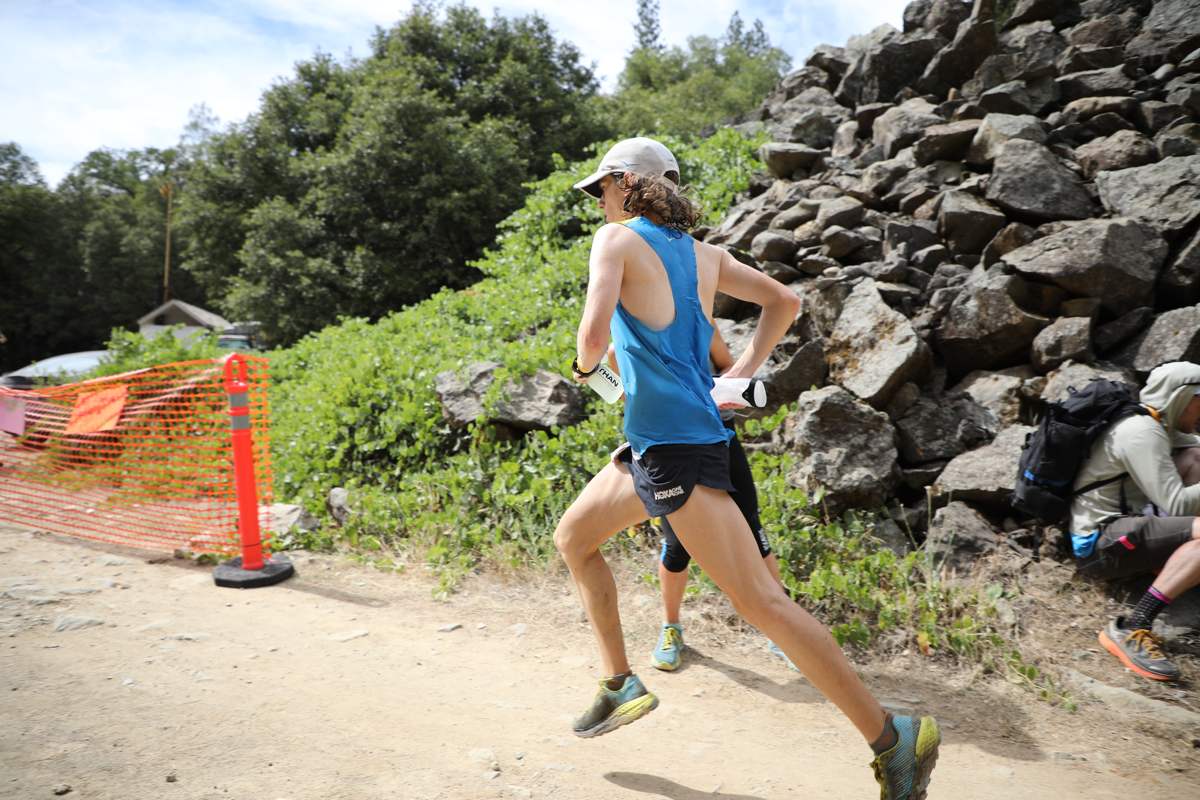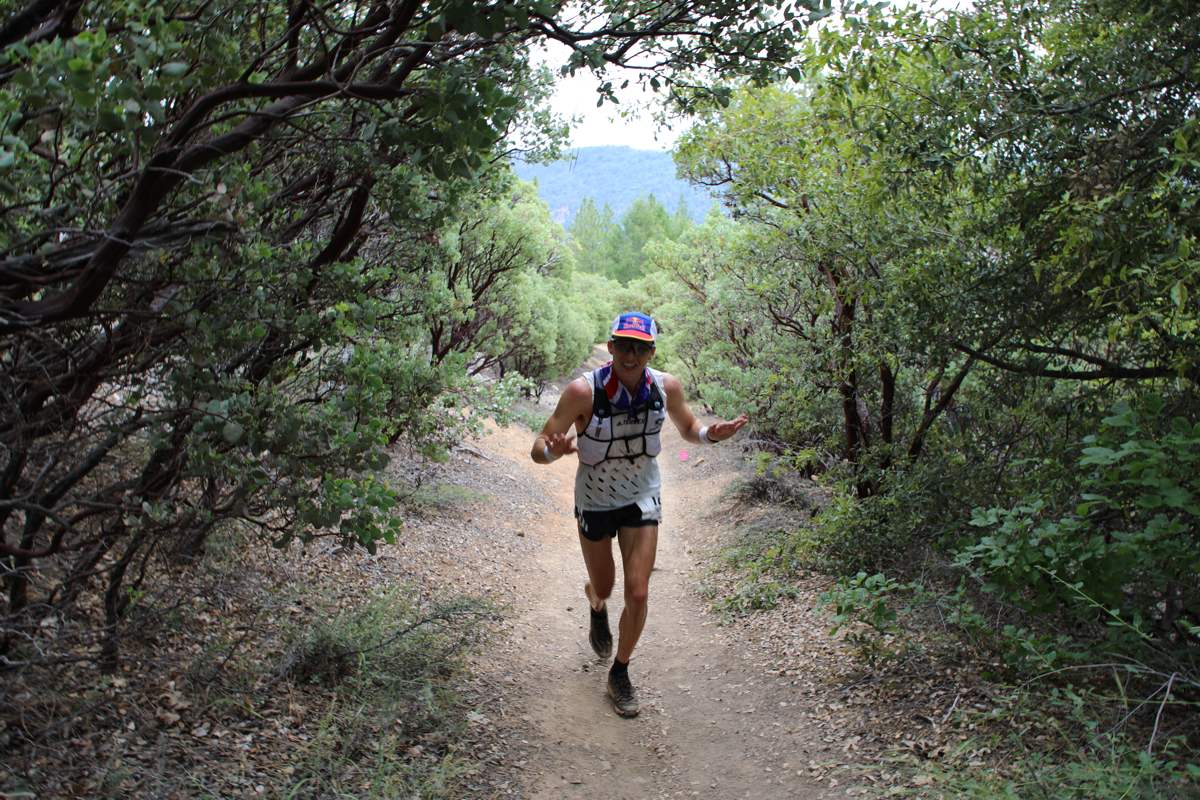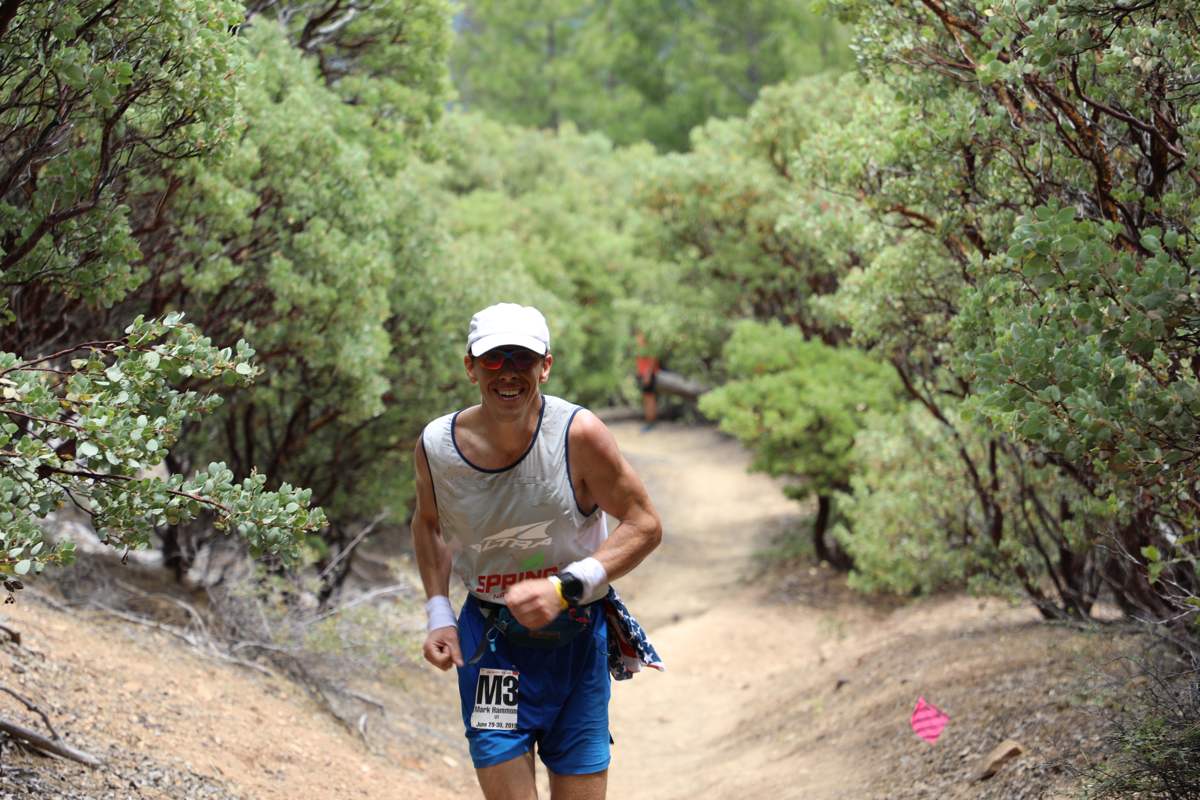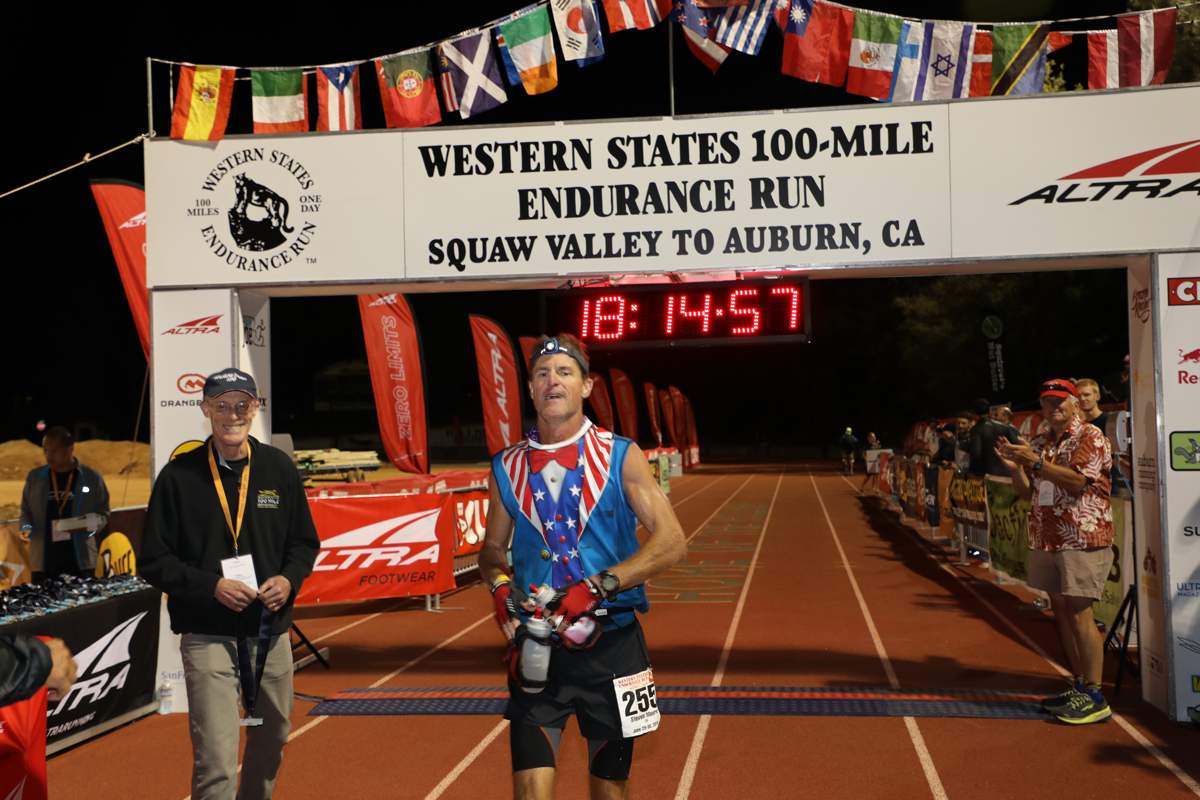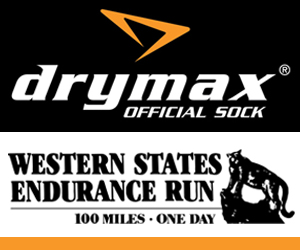 In a rare turn of summer events, a weather system from near Alaska bumped south into California, bringing with it unseasonably cool temperatures to the start of the 2019 Western States 100. As such, the thermometers never even hit the mid-80s Fahrenheit at the race’s lowest altitudes, a good 15 to 20 degrees cooler than normal. With this, many runners were able to press the pace without the heat pressing back, leading to some fast times and, in some runners, aggressive running.
In a rare turn of summer events, a weather system from near Alaska bumped south into California, bringing with it unseasonably cool temperatures to the start of the 2019 Western States 100. As such, the thermometers never even hit the mid-80s Fahrenheit at the race’s lowest altitudes, a good 15 to 20 degrees cooler than normal. With this, many runners were able to press the pace without the heat pressing back, leading to some fast times and, in some runners, aggressive running.
In the women’s race, Clare Gallagher (pre-race and post-race interviews) emerged at the front of a fascinating and dynamic-to-the-wire women’s race to run the second-fastest time in women’s history, while Brittany Peterson and Kaci Lickteig rounded out the women’s podium.
Jim Walmsley (pre-race and post-race interviews) won the men’s race handily, resetting his own 2018 course record by over 20 minutes. Jared Hazen crossed the finish in a solid second place–also under the previous course record–while Tom Evans debuted at the WS 100 in third.
You can now watch the top-three men and top-three women finish and have their finish-line interviews.
![]()
 A special thanks to Drymax for once again making our coverage of the Western States 100 possible!
A special thanks to Drymax for once again making our coverage of the Western States 100 possible!
Thanks also to Hoka One One and BUFF® for their support of our Western States coverage.
2019 Western States 100 Women’s Race
Why is it that we run 100-mile races? They are long and they hurt–sometimes a lot. But there’s something about the mystique of the 100-mile distance that makes them so worthwhile. Over the course of such a long journey, really, anything can happen and nothing is guaranteed. All of that said, I honestly thought this was going to be Courtney Dauwalter’s (pre-race interview) year, again. In fact, as the weather forecast leveled into something resembling cool for race day, I was almost certain she’d set a course record. In fact, I was so convinced I’d written down a lot of fact pieces about Ellie Greenwood’s spectacular course-record run in 2012 to share as part of Dauwalter’s day.
For the race’s first 70 miles, the story played out very close to this. Courtney started rather calmly before spending the race’s middle miles chewing into the course record. And the last time I saw her with my own eyes at mile 61, she looked just fine.
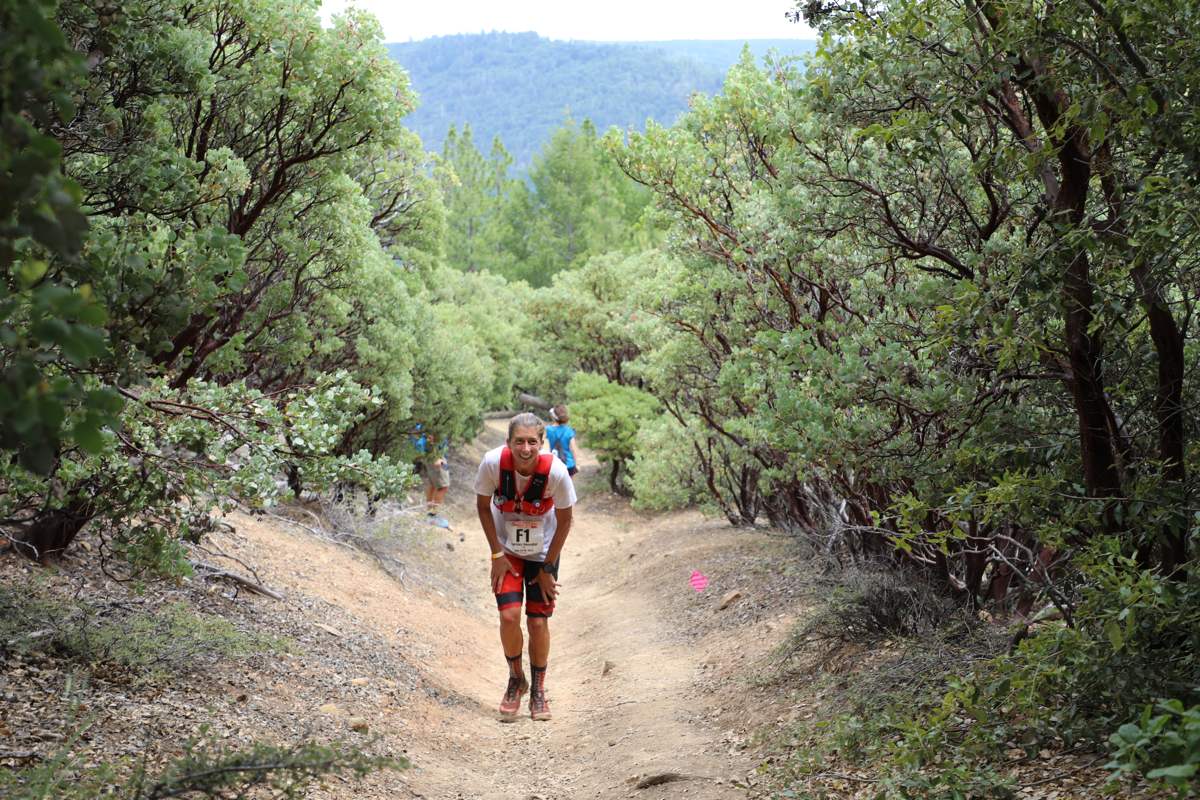
Courtney Dauwalter leading at mile 55 of the 2019 Western States 100… under record pace. All photos: iRunFar/Bryon Powell
So it was with as much surprise as I’m sure we all felt that I heard from members of our coverage team at Peachstone, about mile 71 and along thehighly runnable California Street, that she was limping noticeably. Eight miles later at the Rucky Chucky river crossing, she was still leading, but it wasn’t looking good. She dropped at the Green Gate aid station two miles later with a hip injury.
Enter Clare Gallagher (pre-race and post-race interviews), now 2019 Western States 100 champ. There’s something so full circle about this story, because the only previous time that Gallagher was at the WS 100 was two years ago when she was running in podium position and had to drop at what I believe was after mile 90… with a leg injury. This year, it was she with the body that held itself together for the full distance.
But we need to back up, all the way up to mile 15, because this was where we first saw Gallagher running in second place. This would be the position she would hold all the way up until taking over the race lead after the Rucky Chucky river crossing at mile 78, some 63 miles later. What happened during all these miles? Well, at the finish, Gallagher said she thought she was racing for second place, that essentially there was a women’s race behind Dauwalter’s race. During all that time, she said she was carefully racing the people behind her, meting out the energy she needed to stay ahead of them. But when it was her turn to lead, Gallagher took over with ferocity.
Gallagher’s ferocity was only matched by the fierceness of Brittany Peterson (post-race interview) who, like Gallagher, ran so steadily in third position for much of the race. Peterson settled into third place before mile 15, and ran there until the climb from Rucky Chucky after mile 78 where she moved into second place ahead of an ailing Dauwalter.
And then, really, the race was just beginning. At mile 85, Peterson was in second and nine minutes behind leader Gallagher. Just nine miles later after mile 94, the two were neck and neck through the Pointed Rocks aid station. The race was on and it was clear that this was not going t0 be a hand-holding tie. According to Peterson after the finish, Gallagher surged incredibly after mile 94, and she was unable to respond. Indeed, the numbers match. Between miles 94.3 and 96.8–that’s 2.5 miles–Gallagher gained one minute and 45 seconds. And the difference would grow from there. In the end, Gallagher crossed the finish line in 17:23, what amounts to the second-fastest finish ever in race hisrory. Peterson crossed the line in second place in 17:34, what should be the fourth-fastest time ever.
Somehow, it also seemed clear ahead of time that Kaci Lickteig (pre-race and post-race interviews) should have a very good race. She’s the 2016 champ who’s suffered some ups and downs through the last few years of injury. But this year she’d been injury-free and so consistent in her training and racing that it seemed inevitable that she’d have quite a race. Lickteig ran the first half of the race in the second half of the top 10 before moving up in the race’s second half into her ultimate finish position. When she crossed the line in third place, her 17:55 was a personal PR on the course in her six runnings of the race and faster than when she won in 2015. It’s good to have Lickteig–happy AND competitive–back at the WS 100.
It’s always interesting to watch when a finish line, which is almost exclusively a shared finish line between two separate men’s and women’s races, becomes a women’s finish for a while. Inevitably, men get their solo finish line for the time before women begin arriving, so it’s fun when just women roll over for a spell. And that’s what happened with fourth, fifth, and sixth-place finishers Beth Pascall, Camelia Mayfield, and Kaytlyn Gerbin (pre-race interview). Over the span of some 20 minutes, no man crossed the line–just women. And these three women put on quite a show.
Pascall practiced patience, moving up and seemingly looking stronger and more comfortable as the race went on. It was one of those circumstances that had me thinking she only needed more real estate and she could have found the podium. Ultimately, she took fourth.
Mayfield and Gerbin had an incredible race-closing sprint, with Mayfield overtaking and outsprinting Gerbin only on the Placer High School track in the last meters of the race. They are registered on the results to have finished two seconds apart, but in person, it was a lot closer than that. After each of them running with strength all day, Mayfield and Gerbin respectively finished fifth and sixth.
Nicole Bitter (post-race interview) took seventh, in doing so setting a huge new WS 100 PR of 18:55, which is more than 80 minutes faster than her previous time, which she set back in 2015 in taking sixth.
Kathryn Drew was eighth, and she executed what looked like from the outside as an almost-perfect race. She ran chill and yet focused early before putting the hammer down and holding stake in the women’s top 10 later.
Addie Bracy was ninth in her first WS 100, and I can’t help but think it was a look of relief on her face when she finished. Corrine Malcolm followed up on her ninth place last year with a 10th place this time around, running outside the women’s top 10 until the race’s last 10 miles or less.
Lucy Bartholomew, last year’s third-place finisher, crossed the line in 15th place. 2018 UTMB champion Francesca Canepa was 17th.
Notable DNFs in the women’s race included Camille Herron at mile 55, Amanda Basham at mile 61, and YiOu Wang at mile 67. We haven’t heard details from all of them yet, but did hear Basham hurt her leg in a fall.
2019 Western States 100 Women’s Results
- Clare Gallagher (Patagonia) – 17:23:25 (pre-race and post-race interviews)
- Brittany Peterson (Nike) – 17:34:29 (post-race interview)
- Kaci Lickteig (Hoka One One) – 17:55:55 (pre-race and post-race interviews)
- Beth Pascall (Salomon) – 18:06:51
- Camelia Mayfield (Brooks) – 18:13:31
- Kaytlyn Gerbin (La Sportiva) – 18:13:33 (pre-race interview)
- Nicole Bitter (Altra) – 18:55:14 (post-race interview)
- Kathryn Drew – 18:59:08
- Addie Bracy (Nike) – 19:53:38
- Corrine Malcolm (adidas Terrex) – 20:02:29
2019 Western States 100 Men’s Race
Jim Walmsley’s Course Record
Two years, two course records. Jim Walmsley (pre-race and post-race interviews) reset his own course record at the 2019 Western States 100 through a combination of early race patience, middle-race pressing, and late-race raging. Let’s dig in.
In the first miles of this year’s race, Walmsley didn’t lead, including when we saw him pass over over the race’s high point, at the iconic Escarpment, at mile 3.5. And, by the race’s live tracker, even as late at mile 10 he was still well out of the lead. However, that changed some five miles later when we saw him at mile 15 and he was at the front of the race and about 1.5 minutes in front of everyone else. That said, he looked there like he wasn’t feeling the need to get anywhere too quickly just yet. He was clearly choosing patience in the race’s early miles, and, honestly, this was a kind of Walmsley I’d only seen glimpses of before.
It would go like this until approximately mile 30, at Robinson Flat, where is seemed he’d put his foot on the gas and went through a hair under his own record split for the first time. But easy does it, as from there he’d clip a few seconds or a minute at each aid station off his own record pace such that over 40 miles later at the Peachstone aid station on the Cal Street section of the course, he was 16 minutes ahead of his own course record. These forty-six miles of running, he pressed some.
But then, from miles 70 to mile 94, Walmsley raged, gaining seven minutes on his course record–running a good bit per mile faster than he did last year when he set a then course record–and rolling through the Pointed Rocks aid station at mile 94 over 23 minutes ahead of his record. We all began to think, How low was he going to go? In his interview with us pre-race, he wondered the same. Could he run 10 minutes faster than last year? Twenty minutes? Perhaps even sub-14 hours?
The answer, at least this year, is 14:09:28, improving upon his 2018 finish time of 14:30:04 by over 20 minutes. Walmsley is a pretty intense guy when he races, and he rarely shows much more than a little bit of emotion. It was a true pleasure to watch him cross the line fist pumping, hooting, and hollering. He was legitimately happy and letting it all out, a deserved celebration.
The Rest of the Men’s Race
Jared Hazen’s (pre-race and post-race interviews) nickname amongst friends is the ‘Tank,’ and he was a force rolling down the trail all day. He may be small in frame but his running style today was anything but. He was, for sure, a tank. Like his friend, roommate, and training companion, Jim Walmsley, Hazen was relaxed at the race opening–and even as far as 15 miles in he was in the back half of the men’s top 10.
But when Walmsley went to the front of the race, Hazen went chasing, settling into second place, a position he’d hold all day and all race. Between miles 10 and 40, the gap between Walmsley and Hazen slowly widened from a minute to about 10, and from there that was the approximate gap that would remain between the pair until mile 85. Let me say that again, for 45 miles and with each of them running independently, they maintained just about the same pace, 10 minutes apart from each other.
At the finish line post-race, Hazen would say he paid a little bit late in the race for the pushing he did earlier on to try and stay in contact with Walmsley. This pans out in the numbers, too, because Hazen ultimately finished second and 17-plus minutes off the lead. All that said, his 14:26:46 finish was better than Walmsley’s previous course record and is now the second-fastest men’s time stamp on this race. What a day.
How about those 100-mile debuters, Tom Evans (pre-race and post-race interviews) and Matt Daniels (pre-race interview)? The duo would go third-fourth on the day, each via their own racing style. While both of them said pre-race that they’d aim for a bit of patience early on in the race, on paper it looks as if Daniels held his word a bit better. He was not even in the top 10 at 10 miles into the race! However, by about one third of the way into the race he’d wriggled his way up into third position, which he’d hold through the race’s second third.
Then, there was the journey of Evans, which began a bit more aggressively with him in third just 10 miles into the race, a mid-race lull which would see him lapse back to fifth place in the heart of the canyons part of the course, before he and Daniels flip-flopped positions on Cal Street. At the end, it wasn’t close, with Evans crossing the line as the third and final sub-15-hour finisher of the night and joining the ranks of a select few who’ve finished under that barrier. Daniels arrived 22 minutes later, both showing a special kind of 100-mile racing ability–and future potential. I know it’s still the 2019 race day, but the idea of these top-four men on the starting line next year, all with this year’s accumulated experience, is a grand one.
Mark Hammond (pre-race interview) said in his pre-race interview that he planned to go out a little more aggressively this year, and that he’d been doing interval training to hopefully develop more leg speed. Though he finished fifth after two years finishing in third place, his 15:36 this year is more than a half hour faster than he’d yet run here. His new approach appeared to pay out dividends.
Back in 2015, Gediminas Grinius finished fourth in 15:40. This year, he crossed the line in sixth and 15:43. How about that for consistency? This finish is his first in the U.S.’s Grand Slam of Ultraunning. Next up, the Vermont 100 Mile in three weeks.
What an impressive run we all witnessed out of Stephen Kersh! He took seventh and ran 15:54 in not only his first Western States, but also his first 100 miler. And that’s on the shoulders of him running his first 50 miler just a couple months ago at the Lake Sonoma 50 Mile. We should all expect to see more good things come out of him here in trail ultrarunning.
Patrick Reagan had a helluva’ race! He was not even in the top 10 until No Hands Bridge, almost 97 miles into the race. If we look back to our notes from early in the race, he was running right around 20th place as late as 30 miles in. In the last 3.5 miles, Reagan pushed it even further to finish eighth.
Jeff Browning’s previous WS 100 PR was 16:30, and this year he reduced that to sub-16 hours and 15:54. He crossed the line in ninth place, and Kyle Pietari was hot on his heels in 10th, finishing just a couple seconds later.
Ryan Sandes, the 2017 WS 100 champ, crossed the line in 11th place. Notably, Ian Sharman (post-race interview) did get his 10th finish, but this was the first one outside of the top 10. He crossed the line in 16:54, which is right in there among his finishing times over the years, in 15th place. It’s just that this year took a faster run to get inside the top 10. And, if you add up all 10 finishes, those 1,000 miles took less than a week in total.
Also, 51-year-old Steven Moore ran 18:14:57 to best the men’s 50-to-59 age-group record of 18:43, set by Doug Latimer back in 1988. While Scotty Mills (post-race interview) earned his 20th Western States finish.
A few DNFs to note: Jordi Gamito stopped at mile 78, Morgan Elliott at mile 80, and Eric Senseman at mile 85. Again, we don’t have details, but spoke with Gamito at mile 61 who was both limping and complaining of stomach issues then.
2019 Western States 100 Men’s Results
- Jim Walmsley (Hoka One One) – 14:09:28 (pre-race and post-race interviews)
- Jared Hazen (Hoka One One) – 14:26:46 (pre-race and post-race interviews)
- Tom Evans (adidas Terrex) – 14:59:44 (pre-race and post-race interviews)
- Matt Daniels (Nike) – 15:21:36 (pre-race interview)
- Mark Hammond (Altra) – 15:36:12 (pre-race interview)
- Gediminas Grinius (Vibram) – 15:43:50
- Stephen Kersh (Drymax) – 15:54:15
- Patrick Reagan (Hoka One One) – 15:54:31
- Jeff Browning (Patagonia) – 15:55:06
- Kyle Pietari (Altra) – 15:56:13
Support iRunFar?
If you enjoyed our weeks of Western States coverage and our in-depth reporting from the course, please consider supporting iRunFar in our summer fund drive. Whether it’s a reoccurring monthly pledge, a one-time donation, or a purchase from the iRunFar Store, your support is invaluable helping us do what we do!
Coverage Thanks
Thank you to our coverage team who ran, hiked, and drove all over the Western States course, including Erika Flam, Andrew Block, Kim Wrinkle, Ron Duncan, Case Szesze, Ellie Greenwood, Peach Villacarlos, Dawn, Martin Nash, Mitchell Deacon, Teri Roland, Eric Giovanola, Makiko Yamashita, and Kirk Edgerton. And another round of thanks to Marissa Harris and Mauri Pagliacci who provided invaluable support from afar.
